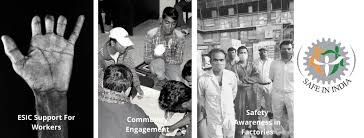In a study by Safe In India, calling for introspection in safety protocols of various supply chain firms in the large automobile manufacturing ecosystem, the foundation discovered and underlined safety gaps in 10 auto giants’ policy frameworks.

About SII
Safe-in-India, a section 8 company, promoted and supported by the 1991 batch of Indian Institute of Management, Ahmedabad (IIMA91), is a foundation that focuses on three areas:
(a) Provide free assistance to injured workers in their health-care and insurance claims from ESIC in Gurgaon,
(b) Use experience and data to influence ESIC to improve their services to all workers in Gurgaon and nationally, and
(c) Influence the auto sector to prevent these accidents in their supply chain.
The findings of the study come after ensuring safe working conditions for workers employed in their ancillary units. It pointed out ‘disrespect for the lives of workers
and the conditions in which they work’ and said that auto giants must set very high standards and demand respect for human safety in their supply chains.
Must Read: How To Build A More Adaptive Supply Chain
The Report
According to the report, the SII team assisted over 2600 injured workers between 2016 to 2021 out of which 440 were between 2020 to 2021 as the year indulged in reduced manufacturing activities due to the pandemic in the Gurgaon-Manesar and Faridabad automobile manufacturing sectors. The report highlighted that nearly 70% of the injured workers lost their fingers or even hands to factory accidents, leading to permanent disability!
The report outlined that over 90% of the auto sector workers that SII assisted reported that they were injured in factories supplying to one or more of the three largest OEMs (original equipment manufacturers) in the region.
Key Findings from 10 Auto Giants:
– Safety policies of most auto majors don’t explicitly say that they cover contract/casual/temporary workers in factories.
– None of the brands have a human rights policy in the public domain, but some documents do mention respect for human rights.
– 7 auto giants don’t have processes to ensure safety in the deeper supply chain but none of them have an SOP.
– There is no supplier code of conduct aligning with national guidelines in 7 auto majors.
Also Read: Flipkart Has Cut Out Single-Use Plastic Packaging From Their Supply Chain
The report by SII is an outcome of its analysis of factory accidents and research of policies and practices of India’s largest OEMs, or auto giants. Among its main observations on the policy framework, it was highlighted that the safety policies of most auto majors don’t explicitly say that they cover contract/casual/temporary workers in their own factories and that seven out of the 10 companies don’t have a supplier code of conduct to align with National Guidelines for Responsible Business Conduct (NGRBC).
More Discoveries
The report said that 90% of the injured workers that SII assisted and analyzed were migrants, from UP, Bihar, or Odisha from which 65% were contractual workers and 95% were not affiliated with any union that could fight for their rights. Further, the report found that 59% of accidents happened on one type of machine – the power press.
Acknowledgements
The Society of Indian Automobile Manufacturers (SIAM) acknowledged the problem and said that the industry should come together to ensure safe working conditions for workers by borrowing from the best practices of automobile giants like Maruti, Tata, and Bajaj. Rajesh Menon, director-general of SIAM, added, “Worker safety is good for business, good for productivity. There have been some good practices, but a lot more should happen. These are some areas that we found important to focus on in our engagement with member OEMs: How to share best practices on safety, how to engage with all levels of the supply chain, and focus on the issue of supplier code of conduct.”
Vinnie Mehta, director-general, Automotive Component Manufacturers Association of India (ACMA), added, “The pandemic has brought to the forefront the importance of HR to an organization – you need to take care of employees because they are important to business continuity and productivity.”
Recommended Read: 5 Effective Strategies To Influence Your Retail Distribution Management
For more articles like “Safe in India Underlining Safety Gaps in Auto Supply Chain”, follow us on Facebook, Twitter, and LinkedIn.